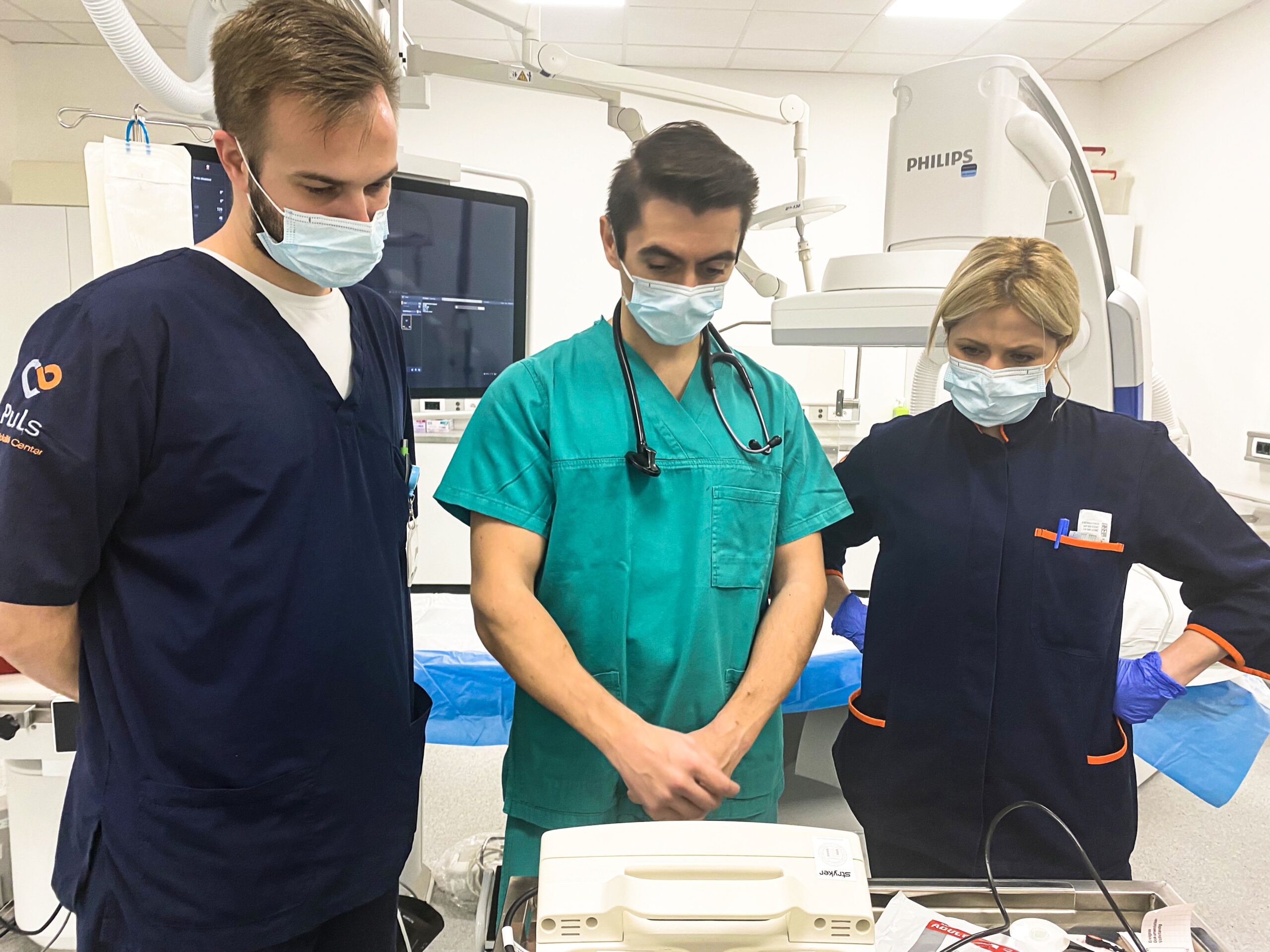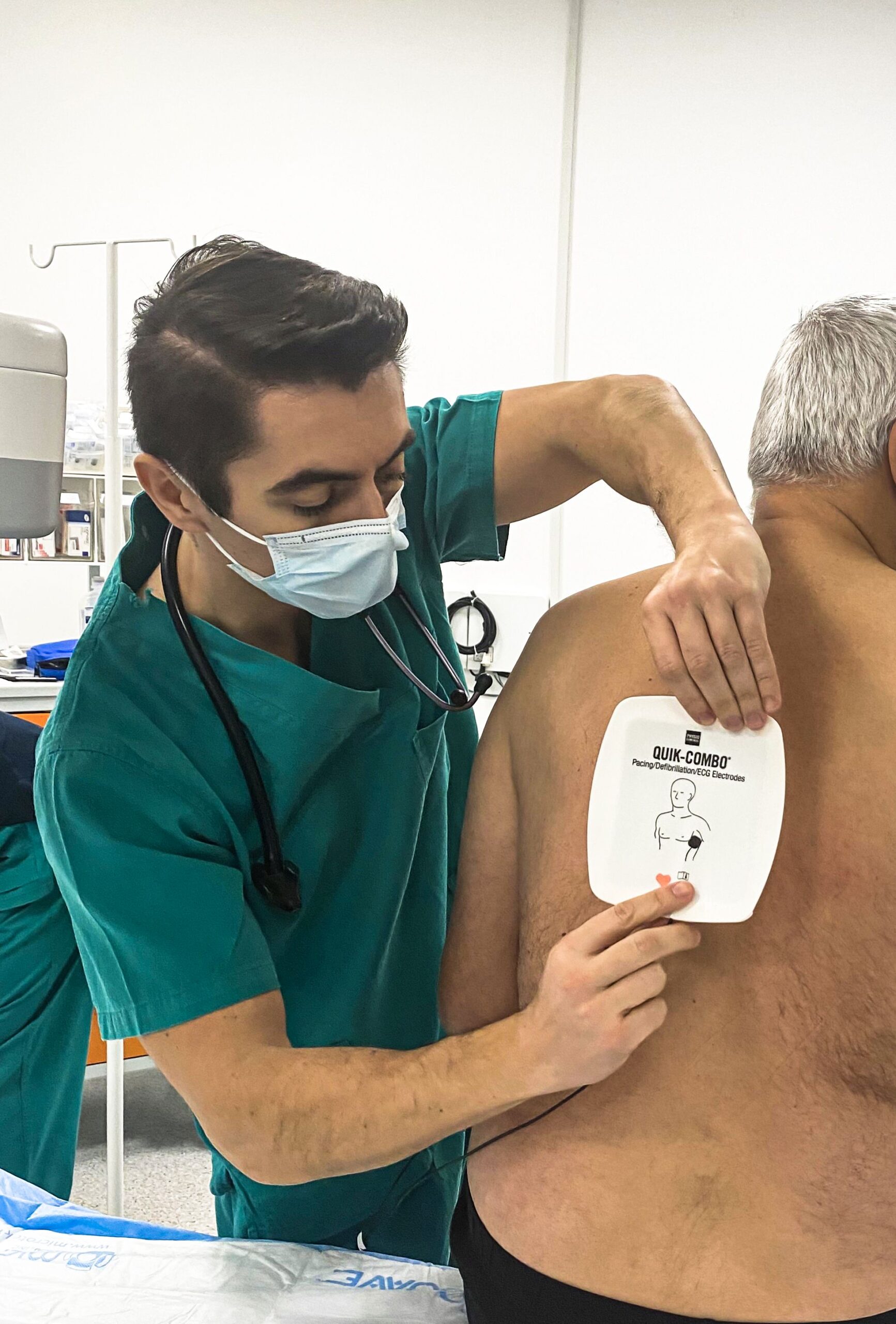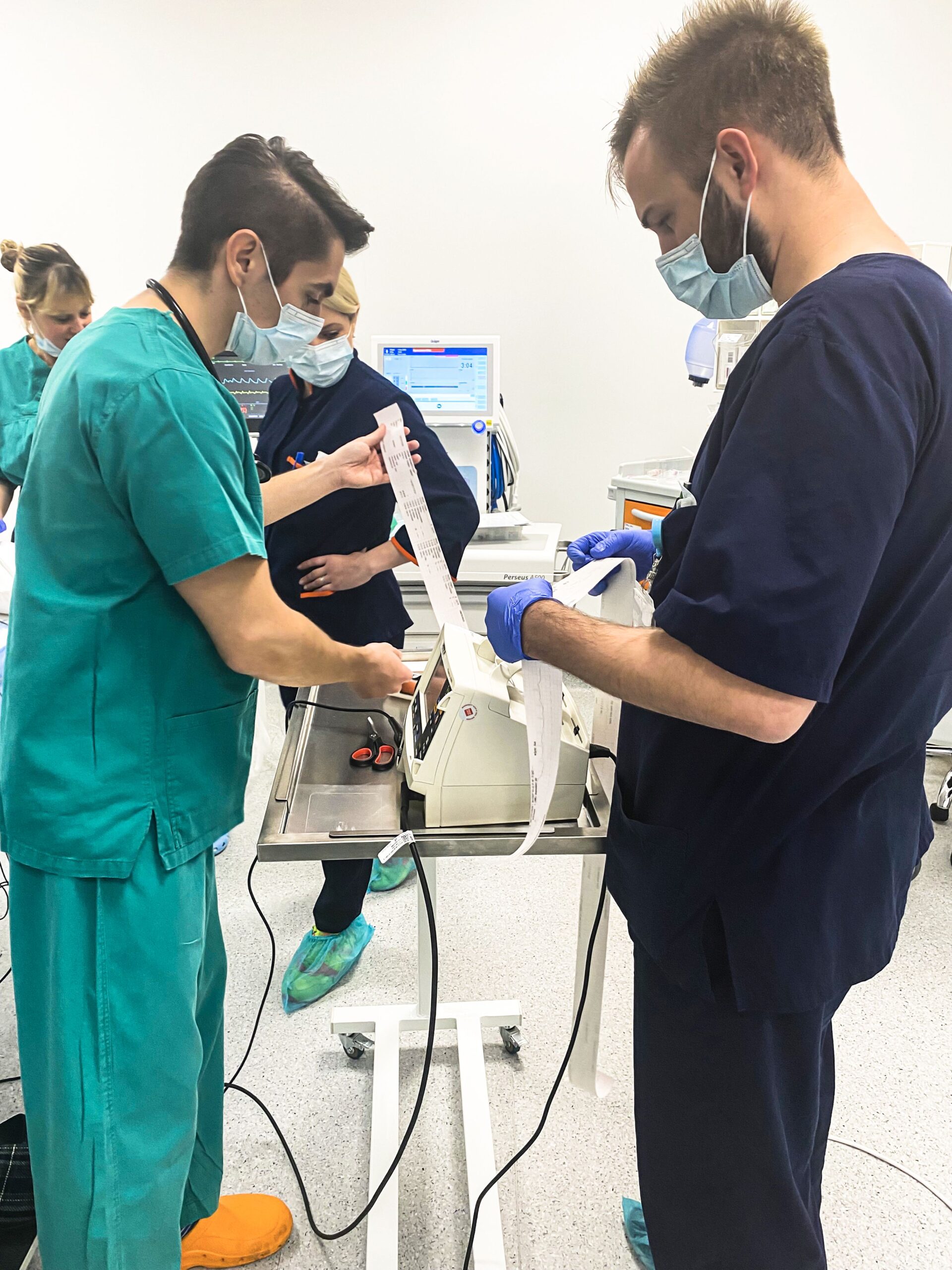Home » Services » Interventional procedures » Cardioversion
Cardioversion
Cardioversion is a medical procedure that restores normal heart rhythm in people with certain types of abnormal heartbeats (arrhythmias).
Electrical cardioversion of heart rhythm is usually done by sending electric shocks to your heart through electrodes placed on your chest. It is also possible to do cardioversion with the help of medication.

Cardioversion is usually a procedure that is pre-scheduled after an examination by a cardiologist or arrhythmologist and is performed in a hospital setting at the Pulse Cardiology Center. You should be able to go home the same day after cardioversion. For most people, electroversion of the heart rhythm quickly restores the normal heart rhythm.
Why a cardioversion is performed
Cardioversion can correct a fast heartbeat (tachycardia) or an irregular one (fibrillation). Cardioversion is usually used to treat people who have atrial fibrillation or atrial flutter. These conditions occur when electrical signals that normally cause your heart to beat at regular speeds do not travel properly through the upper chambers of your heart.
Cardioversion can correct many types of fast or irregular
heart rhythms, including:
·
Atrial fibrillation and atrial flutter (the most
common conditions providers treat with cardioversion).
·
Atrial tachycardia.
·
Ventricular tachycardia.
·
Ventricular fibrillation.
Cardioversion is usually scheduled in advance, but is sometimes done in an emergency.
Cardioversion is usually done with the help of electric shocks, which are given through electrodes attached to the chest while you are under sedation. Electrical cardioversion allows your doctor to immediately see if the procedure has restored normal heart function.
Electrical cardioversion takes less time than drug-only cardioversion. If your doctor recommends cardioversion with drugs to restore your heart rhythm, you will not get an electric shock to the heart.
Electrical cardioversion (with a device): A
defibrillator delivers a shock to your heart through handheld paddles or
through electrode patches on your chest and back. If you’re at high risk for
dangerous arrhythmias or your heart doesn’t work well, your provider may put in
an implantable cardioverter-defibrillator (ICD) that can correct your rhythm.
Wires from the device send a shock to your heart whenever you need it.
Chemical cardioversion (with medicine): Your provider
can give you medicine you swallow or receive through an IV. It can work in
minutes, hours or even days. You may receive this medicine in a hospital so
your provider can keep an eye on your heart rhythm. If you’re taking this
medicine at home, you’ll need to stay in touch with your provider.
Cardioversion is different from defibrillation, an emergency procedure performed when your heart stops or or does not function properly. Defibrillation delivers stronger shocks to correct its rhythm.
Risks of cardioversion
Complications of electrical cardioversion are rare. Our doctors can take steps to reduce the risk. The main risks of cardioversion include:
Dislodged blood clots. Some people who have an irregular heartbeat have blood clots in their heart. Electrical cardioversion can cause these blood clots to move to other parts of your body. This can cause life-threatening complications, such as a stroke or a blood clot that travels to the lungs.
If necessary, your doctor may prescribe blood thinners before the procedure or will check the blood clots in your heart before cardioversion.
Abnormal heart rhythm. In rare cases, some people who have cardioversion develop other heart rhythm problems during or after the procedure. This is a rare complication. If this happens, it usually appears only a few minutes after your procedure. Your doctor may give you medication or additional shocks to solve the problem.
Skin burns. Rarely, some people have minor burns on the skin where the electrodes are placed.
Cardioversion can be done during pregnancy, but it is recommended to monitor the baby’s heartbeat during the procedure.
How to prepare for cardioversion

Cardioversion procedures are usually scheduled in advance. However, if your symptoms are severe, you may need to do cardioversion in an emergency.
It is usual not to eat or drink for about eight hours before the procedure. Your doctor will tell you whether to take any of your regular medicines before the procedure. If you are taking medication before the procedure, drink only enough water to swallow the pills.
Before cardioversion, you may have a procedure called a transesophageal echocardiogram to check for blood clots in the heart. Blood clots can be released by cardioversion, causing life-threatening complications. Your doctor will decide if you need a transesophageal echocardiogram before cardioversion.
If your doctor finds blood clots, your cardioversion will be delayed for three to four weeks. During this time, you will take blood-thinning medications to reduce the risk of complications.
What to expect from a cardioversion procedure
During the procedure
You will receive medication intravenously to fall asleep during the procedure, so you will not feel pain from the shocks. You may be given other medicines in the same way to help restore your heart rhythm.
A nurse or technician places several large patches called electrodes on your chest. The electrodes are connected to the cardioversion machine (defibrillator) by wires. The machine records your heart rate and delivers beats to your heart to restore a normal heart rate. This machine can also correct your heart rate if it beats too slowly after cardioversion.
When you are under sedation, electrical cardioversion usually lasts only a few minutes.
After the procedure
Electrical cardioversion is done on an outpatient basis, which means you can go home the same day your procedure is performed. You will spend an hour or more in the recovery room where our expert team will carefully monitor all vital functions and possible complications.
You need someone to take you home.

Cardioversion – electroversion of the heart rhythm in the Pulse Cardiology Center
Cardiversion is performed by experts in interventional cardiology and electrophysiology. See our team and schedule an appointment. Our call center is available every day until 8 pm on 0117555000 if you have additional questions. You can also contact us via e-mail: info@pulskardioloskicentar.rs
The price of cardioversion – electroversion of heart rhythm
The price of cardioversion is 60,000 dinars
